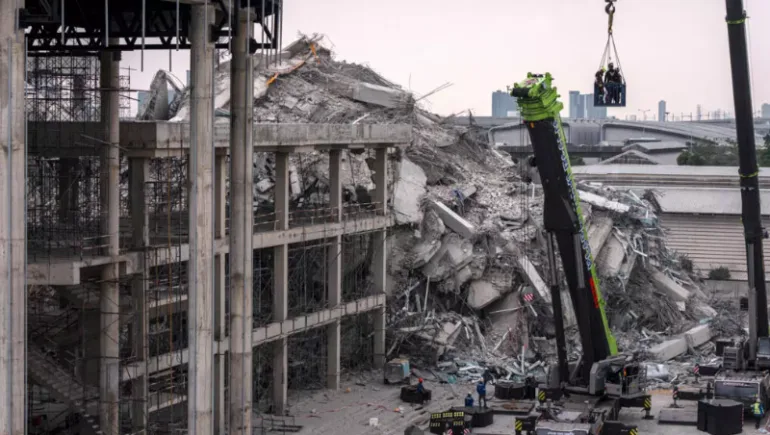Myanmar declared a week of national mourning on Monday following the devastating earthquake that struck the country, as the death toll surpassed 2,000 and hopes of finding more survivors in the rubble of collapsed buildings dwindled.
In a statement, the ruling junta announced that national flags would fly at half-mast until April 6 to honor the victims of Friday’s massive earthquake. This gesture reflects the nation’s sorrow over the lives lost and the widespread damage caused by the disaster.
The junta also declared a minute’s silence on Tuesday at precisely 12:51:02 pm (0621 GMT) – the exact moment the 7.7-magnitude earthquake hit. People across the country are encouraged to pause for a tribute to the victims, with media outlets expected to suspend broadcasting and display mourning symbols. Prayers will also be held at temples and pagodas throughout Myanmar.
The announcement came as rescue efforts in Mandalay, one of the hardest-hit cities and Myanmar’s second-largest, slowed down. With over 1.7 million residents, the city’s situation remains dire. “The situation is so tragic that it’s beyond words,” said Aung Myint Hussein, the chief administrator of Mandalay’s Sajja North mosque.
Many residents are preparing for a fourth night on the streets, either unable to return to their collapsed homes or too fearful of the ongoing aftershocks. While some have tents, many people – including children – are sleeping on blankets in the streets, trying to stay as far from unstable buildings as possible.
The junta reported that 2,056 people have been confirmed dead, with more than 3,900 injured and at least 270 missing. The death toll is expected to rise further. Among the deceased are three Chinese nationals and two French citizens, according to state media from China and a statement from the French Ministry of Foreign Affairs. In Thailand’s capital, Bangkok, the quake caused the collapse of a 30-story tower under construction, leading to at least 19 confirmed deaths.
Outdoor hospitals and resilience
In Mandalay, the 1,000-bed general hospital was evacuated, and patients are now being treated outdoors in the hospital’s car park. Many patients lie on gurneys under temporary tarpaulins, shielded from the harsh tropical sun. Despite the overwhelming situation, relatives comfort the injured by holding hands or fanning them with bamboo fans.
“We are doing everything we can to help,” said one anonymous medic. The intense heat, coupled with the exhaustion of rescue workers, has accelerated the decomposition of bodies, complicating efforts to identify the victims.
However, life in Mandalay is slowly returning to normal. Traffic has resumed on the streets, and street vendors and restaurants have begun operating again. Hundreds of Muslims gathered outside a destroyed mosque to mark the first prayer of Eid al-Fitr, celebrating the end of Ramadan despite the destruction.
A deepening humanitarian crisis
Myanmar, already struggling with the effects of a civil war that erupted after the military coup in 2021, faces an unprecedented crisis. The country’s infrastructure, healthcare system, and economy have been severely damaged, and now the devastation from the earthquake has compounded these challenges.
The World Health Organization (WHO) has declared the earthquake a top-level emergency, seeking $8 million in aid to address immediate humanitarian needs. The International Federation of Red Cross and Red Crescent Societies has launched an appeal for over $100 million to support recovery efforts.
For the first time, Myanmar’s military junta has made a rare public appeal for foreign assistance. Historically, Myanmar’s leaders have rejected foreign aid, even after major disasters. In the wake of the earthquake, the junta thanked key allies, including China, Russia, and India, for their support. Junta spokesman Zaw Min Tun assured the public that the authorities were doing their best to treat the injured and search for the missing.
Despite these efforts, reports have surfaced of the military carrying out air strikes on armed groups opposed to its rule, even as the country grapples with the aftermath of the earthquake. An ethnic minority armed group reported that seven of its fighters were killed in an airstrike shortly after the earthquake struck, and additional airstrikes were reported on Monday.
Myanmar’s ongoing civil war has displaced around 3.5 million people, adding to the immense challenges facing the country in the aftermath of the earthquake.
International efforts
Meanwhile, in Bangkok, the search continues at the site of the collapsed tower. While 12 deaths have been confirmed, at least 75 people remain unaccounted for. Despite the overwhelming devastation, officials have not abandoned hope of finding more survivors amid the rubble.
This unfolding disaster highlights not only the resilience of the people of Myanmar but also the urgency of international support to help them through this immense tragedy.
AFP


